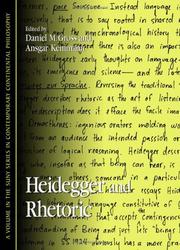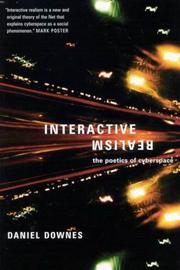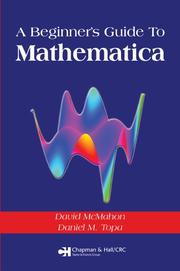| Listing 1 - 10 of 11 | << page >> |
Sort by
|

ISBN: 0791465519 0791465527 9780791465516 9780791465523 Year: 2005 Publisher: Albany: State university of New York press,
Abstract | Keywords | Export | Availability | Bookmark
 Loading...
Loading...Choose an application
- Reference Manager
- EndNote
- RefWorks (Direct export to RefWorks)
Rhetoric. --- Heidegger, Martin, --- Heidegger, Martin, - 1889-1976

ISBN: 1282863266 9786612863264 0773572600 9780773572607 9780773529205 0773529209 9780773528543 0773528547 Year: 2005 Publisher: Montreal : McGill-Queen's University Press,
Abstract | Keywords | Export | Availability | Bookmark
 Loading...
Loading...Choose an application
- Reference Manager
- EndNote
- RefWorks (Direct export to RefWorks)
Distinguishing between the Internet, a communication system, and cyberspace, an environment for human exchange, the author provides a framework for exploring the metaphors and images used in cyberspace to represent and model social reality. He clarifies how these symbolic interactions are linked to the technologies used to create, store, and transmit them and to their social context.
UNSPECIFIED --- Cyberspace --- Digital media --- Human-computer interaction --- Social Change --- Sociology & Social History --- Social Sciences --- Computer-human interaction --- Human factors in computing systems --- Interaction, Human-computer --- Human engineering --- User-centered system design --- User interfaces (Computer systems) --- Social aspects --- CYBERESPACE --- MEDIAS NUMERIQUES --- INTERACTION HOMME-ORDINATEUR --- ASPECT SOCIAL --- Human-computer interaction. --- Social aspects.

ISBN: 0791482766 1423748808 9781423748809 0791465519 9780791465516 0791465527 9780791465523 9780791482766 Year: 2005 Publisher: Albany, New York : State University of New York Press,
Abstract | Keywords | Export | Availability | Bookmark
 Loading...
Loading...Choose an application
- Reference Manager
- EndNote
- RefWorks (Direct export to RefWorks)
Featuring essays by renowned scholars Michael J. Hyde, Theodore Kisiel, Mark Michalski, Otto Pöggeler, and Nancy S. Struever, this book provides the definitive treatment of Martin Heidegger's 1924 lecture course, "Basic Concepts of Aristotelian Philosophy." A deep and original interview with philosopher Hans-Georg Gadamer, who attended the lecture course, is also included. Conducted over the course of three years, just prior to his death in 2002, the interview is Gadamer's last major philosophical statement. By carefully considering this lecture course in the context of Heidegger's life and work, the contributors compel us to reconsider the history and theory of rhetoric, as well as the history of twentieth-century continental philosophy.
Rhetoric. --- Language and languages --- Speaking --- Authorship --- Expression --- Literary style --- Rhetoric --- Heidegger, Martin, --- Khaĭdegger, Martin, --- Haĭdegger, Martin, --- Hīdajar, Mārtin, --- Hai-te-ko, --- Haidegŏ, --- Chaitenger, Martinos, --- Chaitenker, Martinos, --- Chaintenger, Martin, --- Khaĭdeger, Martin, --- Hai-te-ko-erh, --- Haideger, Marṭinn, --- Heidegger, M. --- Haideger, Martin, --- Hajdeger, Martin, --- הייגדר, מרתין --- היידגר, מרטין --- היידגר, מרטין, --- 海德格尔, --- Chaintenker, Martin, --- Hāydigir, Mārtīn, --- Hīdigir, Mārtīn, --- هاىدگر, مارتين, --- هىدگر, مارتين, --- Heidegger, Martin, - 1889-1976
Digital
Abstract | Keywords | Export | Availability | Bookmark
 Loading...
Loading...Choose an application
- Reference Manager
- EndNote
- RefWorks (Direct export to RefWorks)
Book
Year: 2005 Publisher: Cambridge National Bureau Of Economic Research. Working Paper Nr.11332. May 2005
Abstract | Keywords | Export | Availability | Bookmark
 Loading...
Loading...Choose an application
- Reference Manager
- EndNote
- RefWorks (Direct export to RefWorks)

ISBN: 1584884673 9781584884675 Year: 2005 Publisher: Taylor and Francis
Abstract | Keywords | Export | Availability | Bookmark
 Loading...
Loading...Choose an application
- Reference Manager
- EndNote
- RefWorks (Direct export to RefWorks)
Mathematics --- Data processing --- Mathematica (Computer file)
Digital
Year: 2005 Publisher: Cambridge, Mass. NBER
Abstract | Keywords | Export | Availability | Bookmark
 Loading...
Loading...Choose an application
- Reference Manager
- EndNote
- RefWorks (Direct export to RefWorks)
Book
Year: 2005 Publisher: Cambridge National Bureau Of Economic Research. Working Paper Nr.11154. February 2005
Abstract | Keywords | Export | Availability | Bookmark
 Loading...
Loading...Choose an application
- Reference Manager
- EndNote
- RefWorks (Direct export to RefWorks)
Book
Year: 2005 Publisher: Cambridge, Mass. National Bureau of Economic Research
Abstract | Keywords | Export | Availability | Bookmark
 Loading...
Loading...Choose an application
- Reference Manager
- EndNote
- RefWorks (Direct export to RefWorks)
Interest in religious organizations as providers of social services has increased dramatically in recent years. Churches in the U.S. were a crucial provider of social services through the early part of the twentieth century, but their role shrank dramatically with the expansion in government spending under the New Deal. In this paper, we investigate the extent to which the New Deal crowded out church charitable spending in the 1930s. We do so using a new nationwide data set of charitable spending for six large Christian denominations, matched to data on local New Deal spending. We instrument for New Deal spending using measures of the political strength of a state's congressional delegation, and confirm our findings using a different instrument based on institutional constraints on state relief spending. With both instruments we find that higher government spending leads to lower church charitable activity. Crowd-out was small as a share of total New Deal spending (3%), but large as a share of church spending: our estimates suggest that church spending fell by 30% in response to the New Deal, and that government relief spending can explain virtually all of the decline in charitable church activity observed between 1933 and 1939.
Book
Year: 2005 Publisher: Cambridge, Mass. National Bureau of Economic Research
Abstract | Keywords | Export | Availability | Bookmark
 Loading...
Loading...Choose an application
- Reference Manager
- EndNote
- RefWorks (Direct export to RefWorks)
Much of education policy focuses on improving teacher quality, but most policies lack strong research support. We use student achievement gains to estimate teacher value-added, our measure of teacher quality. The analysis reveals substantial variation in the quality of instruction, most of which occurs within rather than between schools. Although teacher quality appears to be unrelated to advanced degrees or certification, experience does matter -- but only in the first year of teaching. We also find that good teachers tend to be effective with all student ability levels but that there is a positive value of matching students and teachers by race. In the second part of the analysis, we show that teachers staying in our sample of urban schools tend to be as good as or better than those who exit. Thus, the main cost of large turnover is the introduction of more first year teachers. Finally, there is little or no evidence that districts that offer higher salaries and have better working conditions attract the higher quality teachers among those who depart the central city district. The overall results have a variety of direct policy implications for the design of school accountability and the compensation of teachers.
| Listing 1 - 10 of 11 | << page >> |
Sort by
|

 Search
Search Feedback
Feedback About UniCat
About UniCat  Help
Help News
News